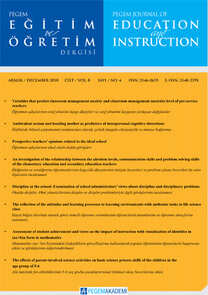Lise Öğrencilerinde Okul Kültürünün Bir Öğesi Olarak Okul Yasam Kalitesi Algısının İncelenmesi
Bu arastırmada, Kars il merkezinde bulunan Genel ve Mesleki Lisesi öğrencilerinin okullarının yasam kalitesine iliskin algılarının incelenmesi amaçlanmıstır. Bu amaçdoğrultusunda arastırmada; ‘‘Okul yasam kalitesi algılarının alt ölçekleri (öğretmenler,okula yönelik olumlu duygular, statü, okul yöneticileri, okula yönelik olumsuz duygular,öğrenciler ve sosyal etkinlikler) arasında anlamlı iliskiler var mıdır?’’, ‘‘Okullarının yasam kalitesi düzeylerine iliskin öğrenci görüsleri okul türü, cinsiyet, sınıf düzeyi, anne ve baba eğitim durumuna göre farklılasmakta mıdır?’’ ve ‘‘Dokuzuncu, onuncu, on birinci ve on ikinci sınıfa devam eden lise öğrencilerinin, okul yasam kalitesi algılarının alt ölçekleri (öğretmenler, okula yönelik olumlu duygular, statü, okul yöneticileri, okula yönelik olumsuz duygular, öğrenciler ve sosyal etkinlikler) arasında anlamlı iliskiler var mıdır?’’ arastırma soruları olarak kabul edilmistir.Arastırma tarama modelinde betimsel bir çalısmadır. Arastırmaya, Kars il merkezinde yer alan Genel ve Mesleki liselerinden yansız olarak belirlenen üç liseden yine yansız olarak belirlenen 358 öğrenci katılmıstır. Veri toplama aracı olarak okul yasam kalitesi hakkında öğrenci görüslerini belirlemek amacıyla Sarı (2011) tarafından revize edilen Liselerde Yasam Kalitesi Ölçeği (LĐSEYKÖ)’i kullanılmıstır. Orijinal ölçeğin Cronbach Alfa iç tutarlık katsayısı ise .86 iken arastırma kapsamında ölçeğin Cronbach Alfa iç tutarlık katsayısı ise .70 olarak hesaplanmıstır.Veriler üstünde bu arastırma için açımlayıcı ve doğrulayıcı faktör analizi, sayı, yüzde,aritmetik ortalama, bağımsız gruplar arası t testi, tek yönlü varyans analizi ve korelasyonanalizleri yapılmıstır. Arastırma sonuçlarına bakıldığında öğrencilerin cinsiyet ile okul yasam kalitesi ölçeğinin alt boyutları arasında ve lise türü ile okula yönelik olumluduygular, statü, okula yönelik olumsuz duygular,öğrenciler, sosyal etkinlikler ve toplam boyutlarında anlamlı bir farklılasma yoktur. Sınıflara göre öğrencilerin öğretmenler, okula yönelik olumlu duygular, okula yönelik olumsuz duygular ve genel toplamda on ikinci sınıf lehine anlamlı bir farklılasma vardır. Öğretmenler, okul yöneticileri, sosyal etkinlikler ve genel toplamda anne eğitim düzeyine göre anlamlı bir farklılık görülürken diğer boyutlarda anlamlı bir farklılık yer almamaktadır. Yine öğretmenler ve öğrencilerboyutlarında baba eğitim düzeyine göre anlamlı bir farklılık görülürken ölçeğin diğer boyutlarında baba eğitim düzeyine göre anlamlı bir farklılık görülmemistir. Arastırma sonuçlarında öğretmenler boyutu ile okul yöneticileri, statü, öğrenciler boyutları arasında ve okula yönelik olumsuz duygular ile genel toplam arasında istatistiksel olarak anlamlı bir iliski bulunmamaktadır. Ancak ölçeğin diğer boyutları arasında istatistiksel olarak anlamlı bir iliski bulunmaktadır.
Anahtar Kelimeler:
Okul yaşam kalitesi, sosyal iklim, kültür, örtük program
An Investigation of High School Students’ School Quality of Life Perceptions as an Element of School Culture
This study aims to investigate regular and vocational high school students’ perceptions of school quality of life. In line with this purpose, the questions that guided the study are “Are there any significant relationships between the sub-dimensions of school quality of life perceptions (teachers, positive feelings about school, status, school authorities, negative feelings about school, students and social activities)?”, “Do the perceptions of students about school quality life differ depending on the factors such as school type, gender, grade level, and parents’ education level?”, and “Are there any significant relationships among sub-dimensions of school quality of life perceptions (teachers, positive feelings about school, status, school authorities, negative feelings about school, students, and social activities) of 9th, 10th, and 11th grade students?”. The study was conducted as a descriptive study making use of survey method. The participants are 358 randomly selected students from three schools randomly selected among regular, vocational, and Science and Anatolian high schools located in Kars city centre. The participants’ perceptions of school quality of life were identified through Scale for Measuring Quality of Life in High Schools (LISEYKO) which was revised by Sarı (2011). Cronbach-Alpha internal consistency coefficient of the original scale is .86 while that of used in the present study was found .70. The data were analysed using factor analysis, numbers, percentages, arithmetic mean scores, t-test for independent groups, one-way analysis of variance, and correlation analysis.The results indicate that there is not any significant relationship between gender and the sub-dimensions of the school quality of life scale, and between the type of high school and positive feelings about school, status, negative feelings about school, students, social activities, and total sub-dimension scores. There is a significant difference between the grade levels and the sub-dimensions of quality of school life scale in relation to teachers, positive feelings about school, negative feelings about school and total scores in favor of the 12th graders. While mothers’ education level reveals significant difference in terms of teachers, school authorities, social activities, and total scores the other subdimensions indicate no difference. Similarly, fathers’ education level demonstrates significant difference in teachers and students sub-dimensions, but not in the other subdimensions. There is not any statistical difference between the teacher sub-dimension and school authorities, status and between the student sub-dimension and negative feelings towards school and total scores. However, there are statistically significant relationships in the other sub-dimensions of the scale.
Keywords:
Quality of school life, social climate, culture, hidden curriculum,
- ISSN: 2146-0655
- Başlangıç: 2011
- Yayıncı: Pegem Akademi Yayıncılık Eğitim Danışmanlık Hizmetleri Tic. Ltd. Şti.
Sayıdaki Diğer Makaleler
Öğretmen Adaylarının Hidroelektrik Santralleri Konusundaki Bilissel Anlayısları
Her Alanda Yeni Steve Jobs’lar Yaratmak için Girisimci Öğretim ve Girisimci Öğretim Üyeliği
Mehmet Nuri GÖMLEKSİZ, Ayşe Ülkü KAN, Ümmühan ÖNER
ÖYP Arastırma Görevlilerinin Yurt İçi ve Yurt Dısı Dil Eğitimlerine İliskin Görüsleri
Ceylan GÜNDEĞER, Sümeyra SOYSAL, Esed YAĞCI
Lise Öğrencilerinde Okul Kültürünün Bir Öğesi Olarak Okul Yasam Kalitesi Algısının İncelenmesi
